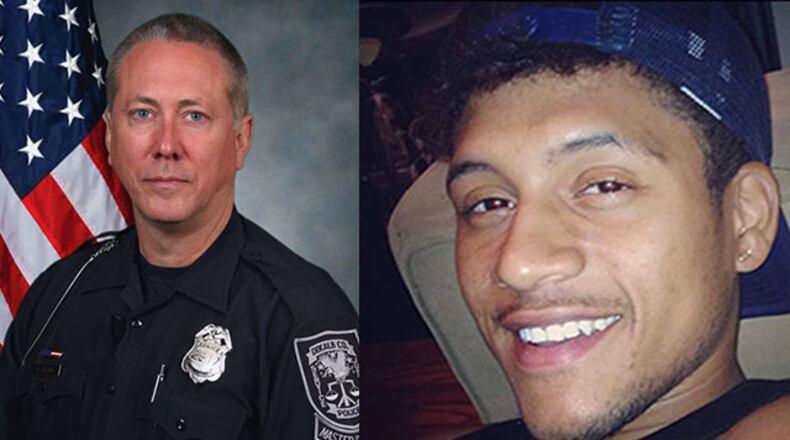Jurors in the upcoming murder trial of former DeKalb County police officer Robert “Chip” Olsen should not be allowed to hear testimony about shooting victim Anthony Hill’s background, such as his mental illness, attitude toward police and military service, a court motion filed Tuesday said.
“Whether Hill was a church-going choir member or a maniacal serial killer is not relevant,” Olsen’s lawyers said.
Olsen is scheduled to stand trial on Sept. 23 with the start of jury selection. He faces two counts of felony murder and other charges involving the March 9, 2015, fatal shooting of Hill, who was naked, unarmed and 27 years old.
Decatur attorney Bob Rubin, who has followed the Olsen case, said the defense could prevail on motions to limit what the state can tell jurors about Hill’s background.
“Whether he’s a vet, whether he’s mentally ill … none of that is relevant unless Olsen knew about it,” Rubin said.
Hill, diagnosed with bipolar disorder after he was deployed in Afghanistan, had stopped taking his medication because it made his tongue swell and sometimes locked his jaw. On the day of the shooting, the manager of the Heights at Chamblee Apartments called 911 after she saw Hill behaving strangely outside her office.
By the time Olsen arrived on the scene, Hill was nude. After Olsen stopped his squad car, Hill started moving toward the officer from across the parking lot. Some witnesses said he was running; others considered it more of a trot. Olsen got out of his car, pulled his handgun, pointed it at Hill and ordered him to stop, witnesses and Olsen said. Hill continued until Olsen, just a few feet away, fired two shots, hitting him in the chest and neck. Hill died at the scene.
In a pretrial hearing last year, Olsen argued that he acted in self-defense. He testified that he feared Hill was going to attack and seriously harm him.
In interviews, Hill’s loved ones said Hill supported the police. In high school, he interned at his hometown police department in Moncks Corner, South Carolina. And amid the furor following the controversial police shooting of Michael Brown in Ferguson, Missouri, Hill took to social media to defend law enforcement.
Olsen’s lawyers don’t want jurors to hear that, arguing in their motion that prosecutors should be prohibited from introducing testimony about Hill’s feelings about police.
If this evidence is allowed to be heard by the jury, it will be unduly prejudicial to Olsen, the defense motion said. The jury, it added, should only be required to focus on Hill’s actions in the time frame leading up to the shooting and Olsen’s observations.
Hill’s background has no relevance to Olsen’s “state of mind, his perception of the danger that he faced or the reasonableness of his response to the apparent attack he was confronting,” the motion said.
The motion is now before Superior Court Judge LaTisha Dear Jackson, who will preside over the trial.
Don Samuel, Olsen’s lead defense attorney, declined to comment Tuesday on his court filing. The DeKalb district attorney’s office also declined to comment, spokeswoman Yvette Jones said.
» PHOTO GALLERY: DeKalb police shootings protest
Rubin, who is not involved in the case, said he doubts the state’s case would suffer much if prohibited from delving into Hill’s background. But Dear Jackson’s rulings on additional challenges filed Tuesday will be much more consequential, he said.
Olsen’s lawyers are seeking to strike from evidence a facet of the case that goes to the heart of one of the two felony murder charges against the former police officer. The underlying felony in that murder count alleges that Olsen violated his oath of office by not following the county’s use-of-force policy when he shot and killed the unarmed Hill.
Olsen’s attorneys say evidence about the use-of-force policy and expert testimony about it should not be allowed because Olsen contends he acted in self-defense. It noted that DeKalb’s own policy is for department use only and should not apply in a criminal proceeding.
Under DeKalb’s policy, an officer has a duty to retreat, Rubin said. State law, when self-defense is raised, does not require that.
“If the jury hears that Olsen had a duty to back off and didn’t, that could be huge,” Rubin said.
It all leads to a larger question hovering over Olsen’s trial and any others in which cops are accused of excessive force.
“Should an officer be held to a higher standard?” Rubin said. “Common sense says yes. Legally, it creates a quandary.”
Subscribe To Our Podcast
The murder trial of former DeKalb police officer Robert "Chip" Olsen will be the focus of the upcoming season of The Atlanta Journal-Constitution's podcast Breakdown.
The season will mark the seventh for the award-winning podcast, which has chronicled some of the biggest criminal cases in Georgia. Get a sneak peek of "Breakdown: Judgment Call" with the trailer, available now.
Don't miss a single episode. Subscribe on Apple Podcasts, Google Play, Stitcher, Spotify or anywhere you listen to podcasts.
The Latest
Featured






